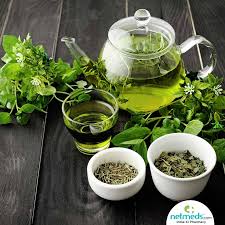A drink or nutritional supplement called green tea has been shown to enhance mental clarity, reduce headaches and upset stomach issues, and aid in weight loss.For thousands of years, it has been used as a traditional medicine and a popular beverage in China and Japan. When it was first introduced to European consumers in the early 17th century, they embraced the beverage right away. Green tea was so valuable and well-liked in eighteenth-century England that it was often smuggled in to avoid taxes.These days, using smuggling is not necessary. Green tea is generally accessible everywhere in the world. Store shelves are stocked with dozens of kinds of bagged green tea that are made from different types of green tea. In addition to loose leaf tea and green tea powder, there are flavored and sweetened variations. There’s definitely a product available on the market that suits your preferred method of consuming green tea.
The unoxidized leaves of the Camellia sinensis plant are used to make green tea. Among the least processed varieties of tea, it has the highest concentration of antioxidants and health-promoting polyphenols.Green tea may help with weight loss, liver problems, type 2 diabetes, Alzheimer’s disease, and other conditions, according to some research. For researchers to conclusively demonstrate these health benefits, more data is needed.This article enumerates the varieties of green tea, their possible health advantages, their nutritional value, and any possible negative consequences.
A review of the 2020 databaseLimited evidence of green tea’s benefits for reducing cancer risk was found in human epidemiological and experimental investigations, according to a reliable source. The results were inconsistent.A total of 1.1 million participants from 142 completed studies were evaluated by the researchers.The topical use of extracts from green tea polyphenols may help shield the skin from UVB rays. An analysis from a 2018 reliable Source of in vivo, in vitro, and human research demonstrating the potential advantages of tea polyphenols in UVB-induced skin cancer chemoprevention.
A review for 2020 According to a reliable source, green tea catechins may be beneficial for the following forms of cancer:
colonic
esophageal
lung
prostate,
liver
Overall, additional human research is required to demonstrate the protective effects of green tea against the risk of cancer in general.

Advantages of Green Tea
Green tea has been associated with numerous health benefits for millennia. Green tea has traditionally been used in China and India to treat bleeding, improve digestion, and regulate body temperature. In recent years, research has been able to demonstrate certain of its health benefits more convincingly than others.
Includes antioxidant substances derived from plants.
Catechins are a particular class of polyphenol found in green tea. Antioxidants called catechins aid in preventing cell damage and offer additional health advantages.The most well-known and prevalent catechin in green tea is called epigallocatechin-3-gallate (EGCG), and studies have shown that it may help with a number of medical illnesses or disease signs.
May enhance cognitive functions
According to a 2017 study by Trusted Source, the presence of chemicals like caffeine and L-theanine in green tea may help with mood, brain function, and cognition.
Additionally, a 2020 study found a 64%Trusted Source reduction in the risk of cognitive impairment in middle-aged and older persons who drink green tea. To investigate this effect further, further human studies are required.
Stock prevention
Another big Japanese study, this one involving more than 82,000 individuals over 13 years, found that higher green tea drinking was associated with a lower risk of stroke. Participants who drank four or more cups per day had the greatest effect.
Benefits for skin
According to studies, green tea may help you have healthier skin by acting as an anti-inflammatory and anti-cancer agent. According to their research, green tea-containing skin care products might be beneficial for you. However, more investigation is required.
Weight Loss
Studies show that green tea’s anti-inflammatory and anti-cancer properties may contribute to healthier skin. Their research suggests that green tea-based skin care products could be good for you. Still, further research is needed.
Side Effects of Green Tea
There isn’t much proof that consuming ginger with green tea could be dangerous. On the other hand, consuming too much ginger may result in heartburn, diarrhea, and even irregular heartbeat. Although consuming too much ginger from drinking green tea and ginger would be challenging, using diet pills that increase the amount of green tea and ginger in them makes it much easier to overdo it.
Make sure you consult your physician before taking any supplements, and pay close attention to the dosage guidelines. For most adults, 8 cups or less of green tea per day is considered safe. However, ingesting large amounts of green tea—especially as an extract—carries some hazards.
Methods for Preparing Green Tea
To make green tea, combine these ingredients:
.Three glasses of purified water.Four bags of green tea
.One tablespoon of thinly sliced, peeled ginger root
.Two tsp of freshly squeezed lemon juice and four slices as garnish
.Two tsp honey